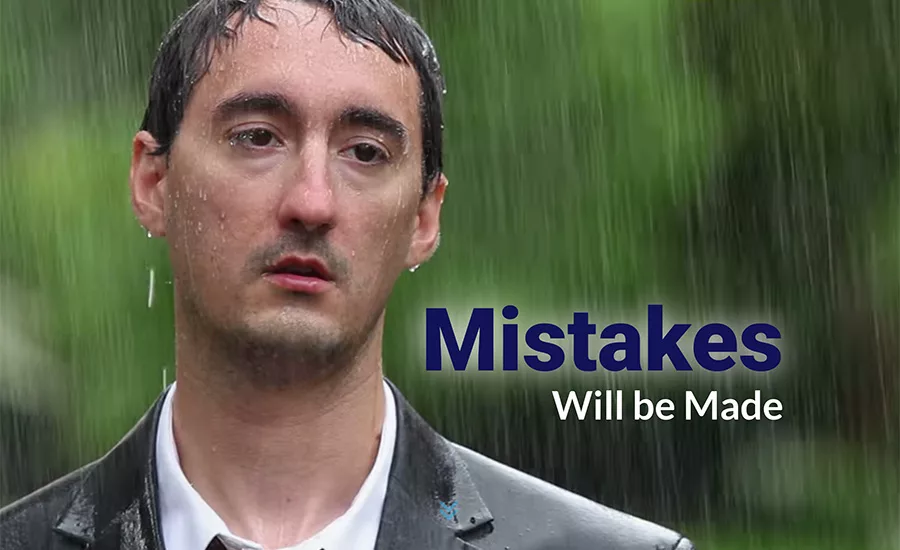Restoration Business Management: Mistakes Will be Made

Image credit: Burlingham/ Creatas Video+ / Getty Images Plus via Getty Images
In 1997, just after returning to Apple, Steve Jobs hosted a town hall where he answered questions from the audience. One of the questions was pointed and intended to be hurtful to both Jobs and his employees. After a pause, Jobs agreed that the company had shortcomings, owned that some of the failure was due to his poor decision making, and praised his people for working hard to create new technology. Quickly following this demonstration of leadership, he also said, “Some mistakes will be made … And that’s good. Because at least some decisions are being made along the way.”
While small businesses are unable to make mistakes or survive failures on the same scale as Apple, it should not be expected that employee performance will always remain flawless. If, as in the town hall answer, employees are working hard and applying learned skills to their job, they should be encouraged to find answers and continuously coached up to the expectations of their performance.
Preventing or Recovering from Failure
In service-related businesses, companies regularly fail on promises made to consumers. A business’s advantage is the effort put toward preventing large, foreseeable failures while correcting small mistakes and accepting ownership of errors caused by their team. Even if they have planned, practiced, or performed an action thousands of times there, will eventually be a slip or failure. If these failures are infrequent, out of character, or the first time that a person has had the opportunity to learn from the mistake, leaders in the company should be forgiving and accept that employees are all human and imperfect.
Preventing large, foreseeable failures is best accomplished by setting a policy or procedure to help avoid the decision making that leads to the error. This is best exemplified by the aviation industry. Aviation failures, according to Malcolm Gladwell, are generally attributed to “… the result of an accumulation of minor difficulties and seemingly trivial malfunctions.” Preparing teams with a checklist or process to determine when certain actions should or should not happen will result in fewer large, foreseeable failures. Keep this documentation simple and direct, avoiding unnecessary commentary or steps that might lead to fatigue in following the process.
As a practice, management should discuss what size and type of errors are acceptable and within an employee’s authority to fix at the cost of the company. Small errors should not require discussion unless they are frequent in nature. Whether this is a forgotten $27 rental charge or an uncommon $10 estimating charge, fixing these errors should occur naturally during business and, if handled appropriately, result in a learning opportunity for the employee.
Proper language about learning and correction should be practiced by supervisors and managers. Consider including phrases like, “Did you consider …?” or “What items could we …?” in your coaching discussions. The intent is to encourage learning instead of the common fear of failure that many employees work to avoid.
Service-related businesses hire employees or contractors, train them, and send them out on projects. Therefore, they should accept ownership of any errors. One thing a leader is unable to know for sure is if the person under their instruction or direction made the same decision they would have made. Simply put, decision-making is unique and based on experiences throughout a career. Sidney Dekker, author of The Field Guide to Understanding Human Error, states that, “you have to assume that people were doing reasonable things given their circumstances. People were doing their best given the complexities, dilemmas, trade-offs and uncertainty that surrounded them. Just finding and highlighting people’s mistakes explains nothing. Saying what people did not do does not explain why they did what they did.” It is not only practical for the business to accept ownership of the mistakes, but it may be their duty to admit that it is their responsibility.
Create a Culture that Embraces Learning from Mistakes
Businesses should strive to create an environment where everyone is considered a learner and it is understood that individuals are likely to make mistakes. Employees should feel safe to ask questions and experiment. First, accept that managers or supervisors will make mistakes or poor decisions at times. While these failures should happen less often because of their experience level, at some point they will perform their duties with less than perfect results. Encourage discussion, led by the supervisor, about the errors and encourage others to ask questions. Next, teach ownership of mistakes. This requires a genuine expression of remorse, an offer of accountability, and trust that the failure will not happen in the future. Knowing these two things about a business will lead to greater transparency and a strong learning culture.
Fail Well
No system is perfect; failure will happen in businesses today and in the future. As your organization embraces failure, there are several practices that can improve how well you fail.
Provide instruction on how the business will learn from failures. Teach that all employees are continually learning and are in charge of improving the company. An owner or manager can support this by emphasizing the effort of work completed as opposed to the results. Certainly, the results matter, but remember that other team members may have challenges that require practice to overcome. They may have needed one more repetition before being able to perform the task with flawless execution. An owner or manager could also teach that; with enough effort, most obstacles can be overcome. For many in service-related industries, this is a daily task. Unique solutions are often sought out for tough problems and should be easily modeled.
For the most part, employees are working diligently to avoid mistakes and will often do the thing that is safe. It is the responsibility of a manager or supervisor to set the stage for decision making and innovation. Encourage experimentation when the possibility of failure is appropriate and within the authority of those on the job to correct. This may lead to a new process or technique that helps improve efficiency or value for the customer. Steve Jobs knew his employees would give their best, be innovative, and make mistakes. If taken as learning opportunities and seldom repeated, mistakes should be a normal part of business that assures employees are giving their best performance. “And that’s good. Because at least some decisions are being made along the way.”
Looking for a reprint of this article?
From high-res PDFs to custom plaques, order your copy today!








